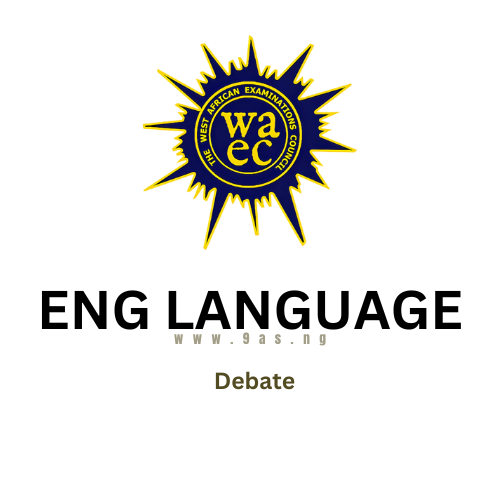Introduction:
Debate writing is a vital component of the WAEC English Language examination. It assesses your ability to present arguments logically and persuasively on a given topic. Mastery of this skill is essential for achieving a high score in the essay section.
Key Concepts:
1. Understanding Debate Writing:
A debate is a formal discussion on a specific topic where opposing arguments are presented. In WAEC exams, you may be asked to write a speech either supporting or opposing a motion, simulating a real-life debate scenario.
2. Structure of a Debate:
- Title: Centered at the top of the page, written in capital letters. It should include the occasion, the speaker’s name, and the topic. For example: A DEBATE PRESENTED BY JOHN DOE ON THE TOPIC: TECHNOLOGY HAS MADE THE WORLD A BETTER PLACE
- Salutation: Begin by addressing the audience in order of hierarchy. For example: Mr. Chairman, Panel of Judges, Accurate Timekeeper, Co-debaters, Ladies and Gentlemen,
- Introduction: Introduce yourself and state your stance on the motion. Express gratitude for the opportunity to speak.
- Body: Develop your points in logical paragraphs. Each paragraph should focus on a single idea, supported by examples or evidence. Use transitional phrases to ensure coherence.
- Conclusion: Summarize the main points and restate your position. End with a strong closing statement to reinforce your argument.
3. Language and Style:
- Use formal and persuasive language.
- Employ rhetorical devices such as rhetorical questions, repetition, and anecdotes to engage the audience.
- Ensure clarity and conciseness.
- Avoid contractions and slang.
4. Common Topics for WAEC Debate Writing:
- Children of literate parents perform better in school than those of illiterate parents.
- Education is the best legacy a parent can give a child.
- Students in rural schools have more advantages than those in urban centers.
- Technology has made the world a better place.
- Education is not as important as riches.
- Violent video games should be banned.
- The youths of today are more interested in the pursuit of pleasure than in academic work.
Study Tips:
- Practice Regularly: Write debates on various topics to enhance your writing skills.
- Read Sample Debates: Analyze well-written debates to understand effective techniques and styles.
- Expand Your Vocabulary: Learn new words and expressions to make your debates more engaging.
- Seek Feedback: Have teachers or peers review your debates and provide constructive criticism.
- Time Management: Practice writing debates within a set time to simulate exam conditions.
Conclusion:
Mastering debate writing is crucial for excelling in the WAEC English Language examination. By understanding the structure, practicing regularly, and refining your language skills, you can effectively convey your arguments and achieve a high score.
Past WAEC questions on debate writing are available below for you to study with.
Debate
1. You are a speaker in a debate on the topic Children of literate parents perform better in school than those of Literate parents. Write your arguments for or against the notion.
2. You are the main speaker in a debate on the topic: Education is the best legacy a parent can give a child. Write your arguments for or against the motion.
3. You are the main speaker in a debate on the topic: Students in rural schools have more advantages than those in the urban centres. Write your arguments/for or against the motion.
4. You are the main speaker in a debate on the topic: Technology has made the world a better place. Write your argument for or against the motion.
5. You are the chief speaker in a debate on the topic: Education is not as important as riches. Write your speech for or against the topic.
6. You are the chief speaker in a debate on the topic: Violent video games should be banned.
7. You are a chief speaker in a debate on the topic: The youths of today are more interested in the pursuit of pleasure than in academic work. Write your speech for or against the topic.


